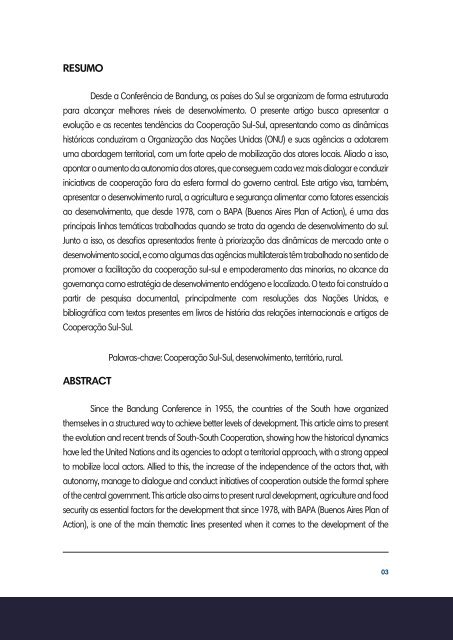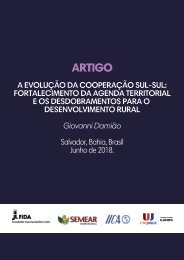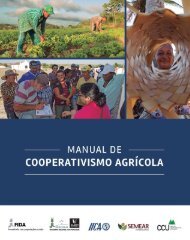The Evolution of South-South Cooperation
Since the Bandung Conference in 1955, the countries of the South have organized themselves in a structured way to achieve better levels of development. This article aims to present the evolution and recent trends of South-South Cooperation, showing how the historical dynamics have led the United Nations and its agencies to adopt a territorial approach, with a strong appeal to mobilize local actors. Allied to this, the increase of the independence of the actors that, with autonomy, manage to dialogue and conduct initiatives of cooperation outside the formal sphere of the central government. This article also aims to present rural development, agriculture and food security as essential factors for the development that since 1978, with BAPA (Buenos Aires Plan of Action), is one of the main thematic lines presented when it comes to the development of the southern agenda. Alongside this, the challenges presented by the prioritization of market dynamics in the face of social development, and how some of the multilateral agencies have worked to promote the facilitation of South-South cooperation and empowerment of minorities, in the achievement of governance as a strategy for endogenous and localized development
Since the Bandung Conference in 1955, the countries of the South have organized themselves in a structured way to achieve better levels of development. This article aims to present the evolution and recent trends of South-South Cooperation, showing how the historical dynamics have led the United Nations and its agencies to adopt a territorial approach, with a strong appeal to mobilize local actors.
Allied to this, the increase of the independence of the actors that, with autonomy, manage to dialogue and conduct initiatives of cooperation outside the formal sphere of the central government. This article also aims to present rural development, agriculture and food security as essential factors for the development that since 1978, with BAPA (Buenos Aires Plan of Action), is one of the main thematic lines presented when it comes to the development of the southern agenda. Alongside this, the challenges presented by the prioritization of market dynamics in the face of social development, and how some of the multilateral agencies have worked to promote the facilitation of South-South cooperation and empowerment of minorities, in the achievement of governance as a strategy for endogenous and localized development
Create successful ePaper yourself
Turn your PDF publications into a flip-book with our unique Google optimized e-Paper software.
RESUMO<br />
Desde a Conferência de Bandung, os países do Sul se organizam de forma estruturada<br />
para alcançar melhores níveis de desenvolvimento. O presente artigo busca apresentar a<br />
evolução e as recentes tendências da Cooperação Sul-Sul, apresentando como as dinâmicas<br />
históricas conduziram a Organização das Nações Unidas (ONU) e suas agências a adotarem<br />
uma abordagem territorial, com um forte apelo de mobilização dos atores locais. Aliado a isso,<br />
apontar o aumento da autonomia dos atores, que conseguem cada vez mais dialogar e conduzir<br />
iniciativas de cooperação fora da esfera formal do governo central. Este artigo visa, também,<br />
apresentar o desenvolvimento rural, a agricultura e segurança alimentar como fatores essenciais<br />
ao desenvolvimento, que desde 1978, com o BAPA (Buenos Aires Plan <strong>of</strong> Action), é uma das<br />
principais linhas temáticas trabalhadas quando se trata da agenda de desenvolvimento do sul.<br />
Junto a isso, os desafios apresentados frente à priorização das dinâmicas de mercado ante o<br />
desenvolvimento social, e como algumas das agências multilaterais têm trabalhado no sentido de<br />
promover a facilitação da cooperação sul-sul e empoderamento das minorias, no alcance da<br />
governança como estratégia de desenvolvimento endógeno e localizado. O texto foi construído a<br />
partir de pesquisa documental, principalmente com resoluções das Nações Unidas, e<br />
bibliográfica com textos presentes em livros de história das relações internacionais e artigos de<br />
Cooperação Sul-Sul.<br />
ABSTRACT<br />
Palavras-chave: Cooperação Sul-Sul, desenvolvimento, território, rural.<br />
Since the Bandung Conference in 1955, the countries <strong>of</strong> the <strong>South</strong> have organized<br />
themselves in a structured way to achieve better levels <strong>of</strong> development. This article aims to present<br />
the evolution and recent trends <strong>of</strong> <strong>South</strong>-<strong>South</strong> <strong>Cooperation</strong>, showing how the historical dynamics<br />
have led the United Nations and its agencies to adopt a territorial approach, with a strong appeal<br />
to mobilize local actors. Allied to this, the increase <strong>of</strong> the independence <strong>of</strong> the actors that, with<br />
autonomy, manage to dialogue and conduct initiatives <strong>of</strong> cooperation outside the formal sphere<br />
<strong>of</strong> the central government. This article also aims to present rural development, agriculture and food<br />
security as essential factors for the development that since 1978, with BAPA (Buenos Aires Plan <strong>of</strong><br />
Action), is one <strong>of</strong> the main thematic lines presented when it comes to the development <strong>of</strong> the<br />
03




